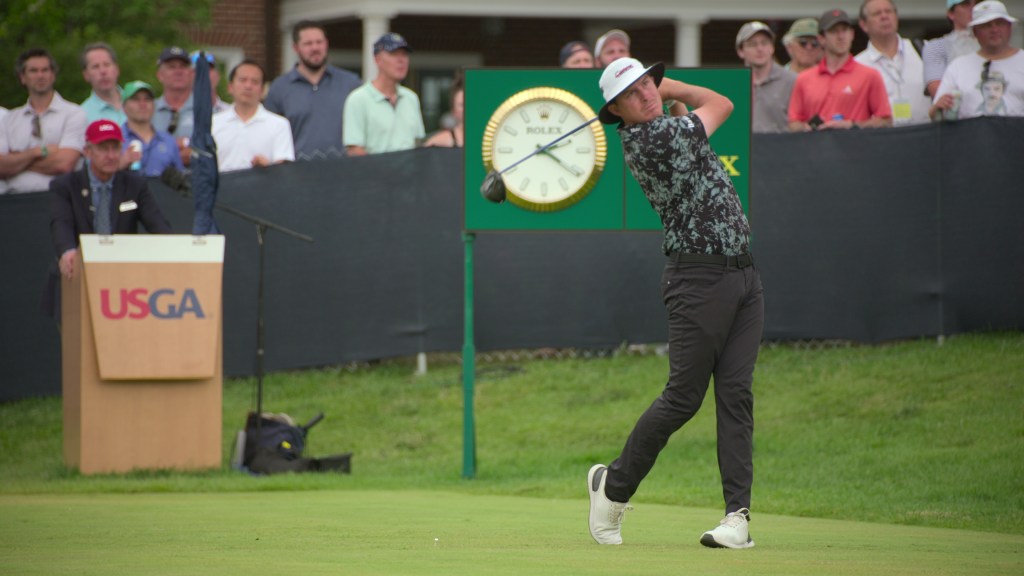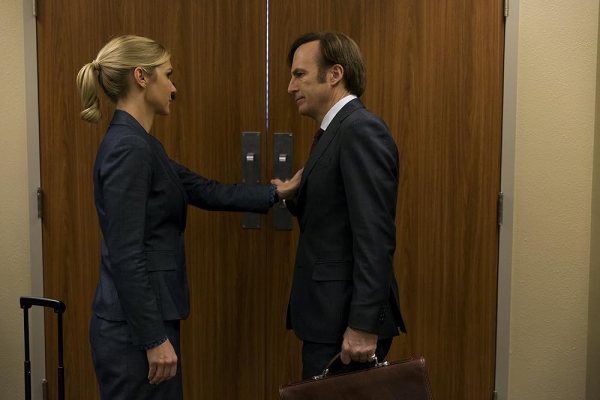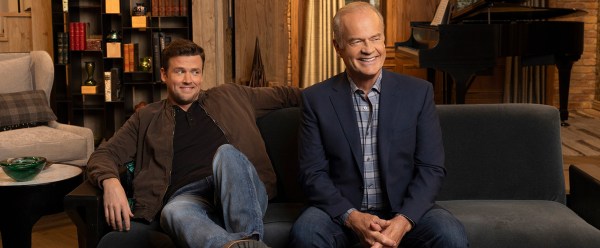Sprawling. That’s the most apt description of PGA Tour events.
They’re contested on golf courses covering 200 acres, plus or minus. With 156 players teeing it up on a given day, tee times are such that some competitors are walking off the 18th green before others have even stepped onto the 1st tee.
Roughly 24,000 shots will be played during the course of a tournament, every one of which will potentially affect every player in the field. But each player will only have witnessed about 700 of them—his own and those of his playing partners.
Multiply this sprawl times the 40-plus events on the PGA circuit each year, and you get a sense of the challenge faced by the producers of Full Swing, the eight-episode Netflix docuseries about the PGA Tour’s 2022 season.
Full Swing largely succeeds, not by trying to chronicle the entire season, but rather by focusing each episode on one or two players occupying various positions in professional golf’s pecking order. And the series shines brightest when it’s capturing the small details.
The first episode is about Jordan Spieth and Justin Thomas, best of friends and certified members of golfdom’s elite. We see them early on as they share a ride home following a tournament—just two, twenty-something goofballs doing card tricks and busting chops. The ride they’re sharing is, of course, a private jet. Life is good at the top of the PGA pecking order.
We later meet a player much lower down: Mito Pereira, a Tour rookie from Chile. He is holding a one-shot lead as he stands on the 18th tee of the final round of the PGA Championship, one of golf’s four majors. He makes a terrible swing with his driver, a swing so sawed-off that his ball had no choice but to flare out to the right and into what was called in pre-trigger-warning days “a water hazard,” but what in today’s more packing-peanut-cosseted times is referred to as “a penalty area.” A drop, a missed green, a bad chip, a missed putt, and in fifteen minutes’ time Tour rookie Pereira falls from likely winning a major to a tied-for-third-place finish. The close-ups of his stunned wife make one want to reach through the screen to give her a hug.
Joel Dahmen has an everyman-not-much-overburdened-by-ambition vibe reinforced by his wearing a bucket hat and saying things like, “Somebody’s got to be the 70th best golfer in the world, so it might as well be me.” Through two rounds of the 2022 US Open, Dahmen was tied for the lead. Walking through the clubhouse grillroom on his way to the locker room before round three, he passed a table at which sat three of the top players in the world—Rory McIlroy (then ranked #3), John Rahm (#2), and Colin Morikawa (#11). They chatted Joel up a bit, and you sensed that Dahmen felt like the president of the chess club who had been called over to the cool kids’ cafeteria table, certain that it would never happen again. (Dahmen finished the tournament tied for tenth.)
In 2013, the US Amateur Championship was played at The Country Club in Brookline, Massachusetts. (Yes, that is an awfully pretentious name for a golf club.) England’s Matthew Fitzpatrick was then 18, looked 12, and won the tournament. When the US Open came to The Country Club in 2022, Fitzpatrick was 27, looked 20, and was tied for the lead after three rounds. Arriving at the parking lot in his courtesy car on the day of the final round (courtesy cars on the PGA Tour run to Mercedes, Lexus, or Cadillac SUVs), he obligingly lowered his window for the attendant who asked: “Player or caddie?” Fitzpatrick impressively resisted the urge to tell the attendant that he was leading the #@^!* tournament, saying simply, “Player. Matt Fitzpatrick.” The attendant looked at his clipboard, checked off a name, and said a perfunctory, “Good luck.” Eight hours later, we see Fitzpatrick hit a nine-iron for the ages out of a fairway bunker and onto the 18th green, pretty much sealing the US Open championship.
Great as those small moments may be, screenwriting majors everywhere who are now hoping to have their ill-considered student loans forgiven know that a good story has to have conflict. And boy have Greg Norman and his Saudi backers delivered.
Norman is an all-time PGA great—only Tiger Woods has spent more time ranked #1 in the world—who is now the CEO of the LIV Tour, an upstart striving to be a viable rival to the PGA. (The name LIV comes from the fact that its tournaments feature three rounds of 18 holes: 54 holes in total, or LIV in Roman numerals.)
LIV has succeeded at poaching PGA players by the simple expedient of paying huge signing bonuses. $200 million to Phil Mickelson. $150 million to Dustin Johnson. Tiger Woods is said to have turned down $700 million. Financed by the sovereign wealth fund of Saudi Arabia, LIV has been tainted as being a pawn in the Saudi government’s “sportswashing” strategy—i.e., associating with sporting events to burnish its less than exemplary human rights record.
Full Swing does not go out of its way to make LIV look good, and Norman’s antic approach to public relations doesn’t help any, either. Asked about the Saudis’ possible involvement in the killing of Washington Post columnist Jamal Khashoggi, Norman replied, “Look, we’ve all made mistakes, and you just want to learn from those mistakes and how you can correct them going forward.”
We see the press conference at which three of LIV’s better known recruits—Graeme McDowell, Louis Oosthuizen, and Dustin Johnson—were asked how they squared joining the LIV Tour with Saudi Arabia’s behavior on the world stage. Whereupon the three of them looked as though someone had just begun herding several dozen cattle through the press room.
Having been in the public eye for so long, Phil Mickelson would seem to be a good spokesman for LIV. He starts out okay, if a bit insipidly: “I don’t condone human rights violations at all. Nobody here does. I’m certainly aware of what’s happened with Jamal Khashoggi, and I think it’s terrible.” But he then drifts into non-sequitur: “I’ve also seen the good that the game of golf has done throughout history, and I believe that LIV Golf is going to do a lot of good for the game as well.”
In the series’ final episode, Amanda Renner, one of Full Swing’s four interstitial narrators, observes, “Golf is an individual sport. There has never been a need for a captain in a locker room, until this year.”
Enter Rory McIlroy. With the emergence of the LIV Tour, McIlroy became the PGA Tour’s de facto captain, serving as its spokesman and doing so with a level of insight and maturity not much in evidence from graduates of the Mickelsonian school of public communication.
McIlroy says things like, “I care deeply about our sport. I care about its history. I care about its legacy. I care about the integrity of the game. And there’s a lot of players out here that share those same views.” And, “When I’m done with the game of golf, whenever that is, if I can hand the game off to the next generation and it’s in a better place than where I found it, then I’ve done a good job.” His affect is such that it’s difficult to doubt his sincerity.
Asked by a reporter how important, after Tiger Woods, Rory’s voice was to the younger players on the Tour, Justin Thomas replied, “He’s very important. He’s the second biggest star we have out here. And it’s not like he was just given that title. He’s done that with really, really good golf, great work, and time with the fans, and he does everything you’re supposed to do to be in the position he’s in.”
As we see Sunday’s final round of the season-ending Tour Championship begin, McIlroy is six shots behind Scottie Scheffler, then (and currently) the #1 player in the world. In an ending more suspensefully satisfying than anything about golf that Hollywood has ever cooked up—and that includes the execrable Tin Cup—Full Swing shows McIlroy rallying to overtake Scheffler by a single stroke, winning the Tour Championship, and with it the FedEx Cup and first prize money of $18 million. That was a season finale that could not have been any better for McIlroy, or for Netflix, or for the PGA Tour. Or any worse for LIV.
Which raises a question. While not quite a PGA vanity project, Full Swing certainly has the Tour’s fingerprints all over it. You don’t get that kind of access without the blessing of as famously secretive an institution as the PGA Tour. And there’s no getting around the fact that Full Swing is a potent bit of PGA propaganda in its war against LIV. Is this problematic? Only if you forget that Full Swing is not journalism, it’s entertainment.
As such, it mostly succeeds. It does drag at times, but golf is kind of draggy. Box to Box Films, which created First Swing, was also behind the wildly popular Netflix docuseries about Formula 1 racing, Drive to Survive. While that show featured rockets flying horizontally at 200 miles-per-hour with the ever-looming possibility of deadly crashes, First Swing shows casually dressed young men swinging golf clubs on nicely manicured lawns, then strolling to their golf ball … and swinging a golf club again. This leisureliness necessitates a lot of B-roll combined with voice-overs that at times tend to be cliché. It’s a bit of a weakness of the series, but it’s inherent in the game, and thus a case of form fitting content.
It’s the small moments in Full Swing, though, that overcome golf’s slow pace. Those small moments could only have been captured by a production that had the resources to flood the zone with cameras and spend hundreds, if not thousands, of hours in editing bays plucking out just the right detail to give us insight into people who are doing extremely difficult things under extraordinary pressure—and the people who care about them. As those screenwriting majors would also tell us, it’s stories about real people that are the ones that tend to work. That’s what Full Swing does pretty well amidst all that sprawl.









Please note that we at The Dispatch hold ourselves, our work, and our commenters to a higher standard than other places on the internet. We welcome comments that foster genuine debate or discussion—including comments critical of us or our work—but responses that include ad hominem attacks on fellow Dispatch members or are intended to stoke fear and anger may be moderated.